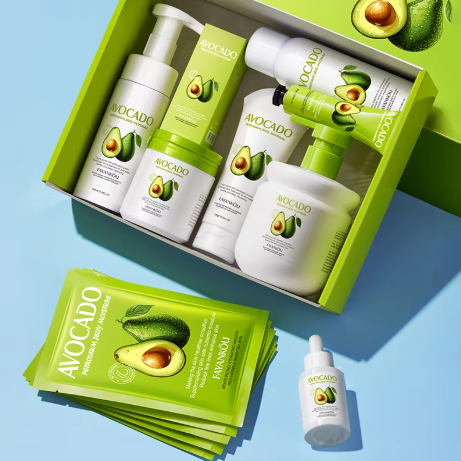ການຮູ້จັກສິນຄ້າທີ່ເປັນธรรมชาດ vs. ສິນຄ້າທົ່ວໄປ ການດູແລໃບຫນ້າ ຜະລິດຕະພັນ
ເມື່ອເບິ່ງທາງເລືອກດ້ານການດູແລຜິວ, ຜະລິດຕະພັນທຳມະຊາດສຳລັບໃບໜ້າເບິ່ງຄືກັນໃນແຕ່ເບິ່ງຄັ້ງທຳອິດ, ແຕ່ທີ່ເປັນຈິງແລ້ວມີຄວາມແຕກຕ່າງຫຼາຍລະຫວ່າງພວກມັນກັບຜະລິດຕະພັນທີ່ຊື້ຕາມຮ້ານທຳມະດາເວລາທີ່ພວກເຮົາກວດເບິ່ງສິ່ງທີ່ນຳມາໃຊ້ໃນການຜະລິດ. ຜະລິດຕະພັນທີ່ດີມັກຈະໃຊ້ສິ່ງທີ່ມີຢູ່ໃນທຳມະຊາດເຊັ່ນສານສະກັດຈາກພືດ, ນ້ຳມັນຫອມລະເຫີຍແທ້ໆ, ແລະສິ່ງດີໆອື່ນໆທີ່ມາຈາກພືດທີ່ສາມາດໃຫ້ອາຫານກັບຜິວແທນທີ່ຈະຢູ່ແຕ່ພຽງຜິວໜ້າ. ຜະລິດຕະພັນທຳມະດາມັກຈະມີສິ່ງທີ່ຜະລິດຂຶ້ນໃນຫ້ອງທົດລອງຫຼາຍຊະນິດລວມທັງສານຊັກຟອກແລະສານກັນເນົ່າທີ່ຮຸນແຮງທີ່ສາມາດເຮັດໃຫ້ຜິວທີ່ແພ້ງ່າຍເສຍຫາຍໄດ້. ສິ່ງທີ່ເຮັດໃຫ້ຜະລິດຕະພັນທຳມະຊາດແຕກຕ່າງແມ່ນວິທີການທີ່ພວກມັນເຮັດວຽກກັບຜິວຂອງພວກເຮົາແທນທີ່ຈະຕ້ານກັບມັນ. ພວກມັນຊ່ວຍເສີມຂະຫຍາຍຊັ້ນປ້ອງກັນທາງດ້ານນອກຂອງຜິວຢ່າງທຳມະຊາດ. ຜະລິດຕະພັນທຳມະດາມັກຈະເຕີມນ້ຳຫອມສັງເຄາະແລະສີສັນທີ່ສວຍງາມທີ່ບໍ່ຄວນມີຢູ່ໃນນັ້ນເຊິ່ງສາມາດເຮັດໃຫ້ເກີດບັນຫາຕ່າງໆສຳລັບຄົນທີ່ມີຜິວບອບບາງ. ສ່ວນຫຼາຍຍີ່ຫໍ້ທຳມະຊາດຍັງພະຍາຍາມເພີ່ມເຕີມໂດຍການໃຊ້ສ່ວນປະກອບທີ່ປູກໂດຍບໍ່ໃຊ້ຢາຂ້າແມງໄມ້ອີກດ້ວຍ. ສິ່ງນີ້ບໍ່ພຽງແຕ່ໝາຍເຖິງສິ່ງທີ່ປອດໄພກວ່າສຳລັບລູກຄ້າເທົ່ານັ້ນແຕ່ຍັງຫຼຸດຜ່ອນຄວາມເປັນໄປໄດ້ຂອງການເກີດການລ້າລື່ນຫຼືການແພ້ໃນອະນາຄົດອີກດ້ວຍ.
ໃນການດູແລຜິວໜ້າ ຄວາມປອດໄພ ແລະ ຄວາມສາມາດໃນການປັບຕົວເຂົ້າກັນໄດ້ດີກັບຜິວໜັງຂອງເຮົານັ້ນມີຄວາມສຳຄັນຫຼາຍ ໂດຍສະເພາະເວລາທີ່ພວກເຮົາເບິ່ງເຖິງທາງເລືອກໃນການດູແລຜິວໜ້າທີ່ເປັນທຳມະຊາດ. ຜະລິດຕະພັນທຳມະຊາດສ່ວນຫຼາຍຈະຖືກທົດສອບຢ່າງລະອອຍເພື່ອໃຫ້ແນ່ໃຈວ່າມັນປອດໄພ ແລະ ສາມາດເຮັດວຽກກັບຜິວໜັງຂອງມະນຸດໂດຍບໍ່ເກີດອັນຕະລາຍ. ຄວາມຈິງແລ້ວ ຜະລິດຕະພັນດູແລຜິວທົ່ວໄປທີ່ຜະລິດມາຈາກສ່ວນປະສົມທີ່ບໍ່ແມ່ນທຳມະຊາດບໍ່ໄດ້ຖືກກວດກາຢ່າງເຂັ້ມງວດເທົ່າກັບກຸ່ມຢ່າງ FDA ຫຼື ກົດລະບຽບຂອງສະຫະພັນເອີຣົບ. ສິ່ງນີ້ອາດຈະເຮັດໃຫ້ເກີດຜົນຕອບສະໜອງທີ່ບໍ່ດີຕໍ່ບາງຄົນ. ຕາມບົດລາຍງານກ່ຽວກັບການແພ້ທີ່ພວກເຮົາໄດ້ເຫັນ ສ່ວນຫຼາຍແລ້ວຜົນກະທົບທາງດ້ານຜິວໜັງທີ່ຮ້າຍແຮງມາຈາກສ່ວນປະສົມທີ່ບໍ່ແມ່ນທຳມະຊາດທີ່ພົບໃນຜະລິດຕະພັນທົ່ວໄປ. ນັ້ນແມ່ນເຫດົການທີ່ເຮັດໃຫ້ຄົນຈຳນວນຫຼາຍຫັນມາໃຊ້ທາງເລືອກທີ່ເປັນທຳມະຊາດໃນມື້ນີ້. ຜະລິດຕະພັນດູແລຜິວໜ້າທຳມະຊາດມັກຈະປະກອບດ້ວຍສ່ວນປະກອບທີ່ມາຈາກພືດທີ່ອ່ອນໂຍນ ແລະ ມີຜົນກະທົບຕໍ່ການອັກເສບ. ສ່ວນປະກອບທີ່ມາຈາກພືດເຫຼົ່ານີ້ເຮັດໃຫ້ຜະລິດຕະພັນມີຄວາມປອດໄພຫຼາຍຂຶ້ນໂດຍລວມ ແລະ ສຳຄັນຫຼາຍສຳລັບຄົນທີ່ມີຜິວໜັງທີ່ອ່ອນໄຫວ ແລະ ຕ້ອງການຜະລິດຕະພັນທີ່ບໍ່ເຮັດໃຫ້ເກີດການລ້າລື້ນ ແລະ ສາມາດປັບຕົວເຂົ້າກັບຄວາມຕ້ອງການຂອງຜິວໜັງຂອງເຂົາເຈົ້າໄດ້ດີຂຶ້ນ.
ໃນການປຽບທຽບສ່ວນປະກອບທີ່ເຮັດມາຈາກພືດກັບສິ່ງທີ່ເປັນສັງເຄາະ ຜູ້ທີ່ມັກດູແລຜິວໜ້າຕ້ອງຄິດເຖິງສິ່ງທີ່ເຮັດວຽກໄດ້ດີທີ່ສຸດສຳລັບຜິວໜັງຂອງເຂົາເຈົ້າເອງ. ການຄົ້ນຄວ້າສະແດງໃຫ້ເຫັນວ່າສ່ວນປະກອບທຳມະຊາດຫຼາຍຊະນິດແທ້ຈິງແລ້ວສາມາດທຽບເທົ່າກັບຫຼືເຖິງຂັ້ນດີກວ່າທາງເລືອກທີ່ເປັນສັງເຄາະໃນການຮັກສາຄວາມຊຸ່ມຊື່ນຂອງຜິວໜັງ ແລະ ການຕໍ່ຕ້ານສັນຍານຂອງການແກ່ລົງ. ສິ່ງທີ່ເຮັດໃຫ້ພືດມີຄວາມພິເສດແມ່ນຫຍັງ? ພວກມັນປະກອບມີສານປະໂຫຍດຕ່າງໆ ທີ່ເຮັດວຽກຮ່ວມກັນໃນວິທີທີ່ສານເຄມີທີ່ຜະລິດໃນຫ້ອງທດລອງບໍ່ສາມາດສ້າງຂຶ້ນມາໄດ້. ສານທີ່ມາຈາກພືດເຫຼົ່ານີ້ຈະແກ້ໄຂບັນຫາຫຼາຍຢ່າງພ້ອມກັນແທນທີ່ຈະໃສ່ໃຈກັບສິ່ງໃດສິ່ງໜຶ່ງເທົ່ານັ້ນ. ສິ່ງທີ່ເປັນສັງເຄາະອາດຈະໃຫ້ຜົນໄດ້ທັນທີໃນເບື້ອງຕົ້ນ ແຕ່ຄົນສັງເກດເຫັນບັນຫາຕ່າງໆຫຼັງຈາກນັ້ນເຊັ່ນການອັກເສບ ຫຼື ຄວາມອ່ອນໄຫວ. ຜູ້ຊ່ຽວຊານດ້ານຜິວໜັງທີ່ພວກເຮົາໄດ້ເວົ້າດ້ວຍແນະນຳໃຫ້ໃຊ້ສິ່ງທຳມະຊາດໃນຫຼາຍໆເວລາເນື່ອງຈາກວ່າຜະລິດຕະພັນເຫຼົ່ານີ້ມັກຈະສ້າງຜິວໜັງທີ່ເຂັ້ມແຂງຂຶ້ນໃນໄລຍະເດືອນແທນທີ່ຈະບໍ່ກີ່. ນອກຈາກນັ້ນ ຜິວໜັງຂອງພວກເຮົາເບິ່ງຄືຈະຕອບສະໜອງດີຂຶ້ນຕໍ່ສິ່ງທີ່ທຳມະຊາດສະໜອງໃຫ້ຢ່າງເປັນທຳມະຊາດໂດຍບໍ່ມີສານເຄມີເພີ່ມເຕີມມາລົບກວນສິ່ງຕ່າງໆ.
ໜ້ອຍແລະບໍ່ສົ່ງຜົນໃຫ້ເกີດການເສຍໃຈ
ຜະລິດຕະພັນດູແລຜິວໜ້າທຳມະຊາດມັກມີສ່ວນປະສົມທີ່ອ່ອນໂຍນກ່ວາ ເຊິ່ງເຮັດວຽກໄດ້ດີສຳລັບຄົນທີ່ມີຜິວໄວຕໍ່ສິ່ງເຄືອນໄຫວ ເຊິ່ງຊ່ວຍຫຼຸດບັນຫາການແພ້ ແລະ ຜິວແດງ. ການຄົ້ນຄວ້າໄດ້ສະແດງໃຫ້ເຫັນເປັນເວລາວ່າ ຄົນທີ່ເລືອກຜະລິດຕະພັນທຳມະຊາດມັກຈະລາຍງານບັນຫາໜ້ອຍລົງ ເມື່ອປຽບທຽບກັບເວລາທີ່ພວກເຂົາໃຊ້ຜະລິດຕະພັນທີ່ມີສານເຄມີເຂັ້ມຂຸ້ນ. ສູດທຳມະຊາດຫຼາຍຊະນິດຍັງມີພືດທີ່ຊ່ວຍບຳລຸງຜິວເຊັ່ນ ດອກໄມ້ແພ, ແລະ ໂອກາໂບ, ທັງສອງຢ່າງນີ້ຖືກພິສູດແລ້ວວ່າຊ່ວຍຄວບຄຸມຜິວອັກເສບ. ນັ້ນແມ່ນເຫດຜົນທີ່ພໍ່ແມ່ຫຼາຍຄົນເລືອກໃຊ້ພວກນີ້ເຊັ່ນກັນ. ຄວາມອ່ອນໂຍນຂອງຜະລິດຕະພັນເຫຼົ່ານີ້ໝາຍຄວາມວ່າມັນສາມາດໃຊ້ໄດ້ຢ່າງປອດໄພໃນທຸກໄລຍະອາຍຸ ແຕ່ເດັກນ້ອຍນ້ອຍໆຈົນເຖິງຜູ້ໃຫຍ່ທີ່ມີບັນຫາຜິວໄວ ຫຼື ຜິວເສຍຫາຍ.
ສູດທີ່ເຕັມດ້ວຍຫຼາຍຂອງຫຼາຍສຳລັບສຸຂະພາບຂອງເນື້ອໝາກ
ຜະລິດຕະພັນດູແລຜິວໜ້າທຳມະຊາດປະກອບມີສານດີໆ ຫຼາຍຢ່າງສຳລັບຜິວໜັງ, ລວມທັງວິຕາມິນ, ເກືອແຮ່ ແລະ ສານຕ້ານອະນຸມູນອິດສະລະທີ່ທຸກຄົນເວົ້າເຖິງໃນປັດຈຸບັນ. ສານຕ້ານອະນຸມູນອິດສະລະເຫຼົ່ານີ້ຊ່ວຍປ້ອງກັນຜິວໜັງຈາກການຖືກເສຍຫາຍຈາກສິ່ງທີ່ພວກເຮົາບໍ່ສາມາດຄວບຄຸມໄດ້ໃນສິ່ງແວດລ້ອມຂອງເຮົາ. ຕົວຢ່າງເຊັ່ນ ນ້ຳມັນທັນຍະພືດ ແລະ ນ້ຳມັນເຊຍ (shea butter) ມີຊື່ສຽງຫຼາຍໃນການເຮັດໃຫ້ຜິວໜັງຮູ້ສຶກນຸ້ມນວນ ແລະ ສົດໃສດີຂຶ້ນຫຼັງຈາກໃຊ້ເປັນປະຈຳ. ແຕ່ສິ່ງທີ່ເຮັດໃຫ້ຜະລິດຕະພັນເຫຼົ່ານີ້ມີຄວາມພິເສດແມ່ນວິທີການປະສົມສ່ວນປະກອບຕ່າງໆເຂົ້າກັນເພື່ອແກ້ໄຂບັນຫາຕົວຈິງທີ່ຄົນມີກັບຜິວໜັງຂອງເຂົາເຈົ້າ, ບໍ່ວ່າຈະເປັນສິວທີ່ບໍ່ຫາຍ, ຜິວແຫ້ງຈາກເຊື້ອເຟື້ອຍ, ຫຼື ຄວາມຕ້ອງການໃນການຊ້າລົງຂອງຮ່ວງຮ້າວຕາມກຳນົດເວລາ.
ກາຍຟັງເຄື່ອງໝາຍທີ່ເຫຼົ້າໃນການເຮັດໃຫ້ເຄື່ອງໝາຍ
ຫຍັງທີ່ເຮັດໃຫ້ຜະລິດຕະພັນດູແລຜິວໜ້າທຳມະຊາດແຕກຕ່າງອອກມາ? ພວກມັນຈະບໍ່ມີສານອັນຕະລາຍເຊັ່ນ: parabens ແລະ sulfates ທີ່ຄົນສ່ວນໃຫຍ່ກັງວົນກ່ຽວກັບ. ການຄົ້ນຄວ້າສະແດງໃຫ້ເຫັນວ່າ parabens ສາມາດເຮັດຕົວເອງຄືກັບ estrogen ໃນຮ່າງກາຍຂອງພວກເຮົາ, ເຮັດໃຫ້ຮະມອນ (hormone) ບໍ່ດຸ່ນດ່ຽງໃນໄລຍະຍາວ. ນັ້ນແລະເປັນເຫດຜົນທີ່ເຮັດໃຫ້ຄົນບາງຄົນກັງວົນກ່ຽວກັບຜົນກະທົບຕໍ່ສຸຂະພາບ. ສ່ວນ sulfates ນັ້ນເປັນສານລ້າງທີ່ຮຸນແຮງທີ່ເຮັດໜ້າທີ່ລ້າງນ້ຳມັນດີໆອອກຈາກຜິວໜັງຂອງພວກເຮົາ, ເຮັດໃຫ້ຜິວໜັງແຫ້ງແລະອັກເສບ. ບໍ່ແປກໃຈເລີຍທີ່ຄົນຈຳນວນຫຼວງຫຼາຍຈຶ່ງຫັນມາໃຊ້ຜະລິດຕະພັນທີ່ບໍ່ມີສານເຫຼົ່ານີ້ເມື່ອເຂົາເຈົ້າເລີ່ມສັງເກດເຫັນວ່າຜິວໜັງແຫ້ງຫຼືເປັນແດງ. ເມື່ອຍີ່ຫໍ້ຜະລິດຕະພັນຍຶດໝັ້ນໃນການໃຊ້ສ່ວນປະກອບທີ່ສະອາດແທນທີ່ຈະຕັດຂັ້ນຕອນດ້ວຍສານເຕີມແຕ່ງລາຄາຖືກ, ລູກຄ້າມັກສັງເກດເຫັນຄວາມແຕກຕ່າງ. ຄົນເຮົາຢາກຮູ້ວ່າສິ່ງໃດຖືກໃຊ້ໃນຜະລິດຕະພັນດູແລຜິວໜັງຂອງເຂົາເຈົ້າ, ແລະຄວາມໂປ່ງໃສນີ້ກໍຊ່ວຍສ້າງຄວາມໄວ້ວາງໃຈໃນອຸດສະຫະກຳທີ່ຄວາມໄວ້ວາງໃຈມີຄວາມສຳຄັນຫຼາຍ.
ຜົນກະທົບຕໍ່ສິ່ງແວດລ້ອມ ແລະ ຄວາມຍືນຍົງ
ເຄື່ອງໝາຍທີ່ສลายໄດ້ແລະການລົບລັບການມັນເສີ
ຜະລິດຕະພັນດູແລຜິວໜ້າທີ່ຜະລິດຈາກແຫຼ່ງທຳມະຊາດມັກຈະດີກວ່າສຳລັບດາວດິນເນື່ອງຈາກມັນປະກອບມີສ່ວນປະກອບທີ່ແທ້ຈິງແລ້ວແຍກຕົວອອກໄດ້ຕາມກາເວລາແທນທີ່ຈະຄ້າງຢູ່ຕະຫຼອດ. ຕ່າງຈາກສານເຄມີສັງເຄາະທີ່ພົບເລື້ອຍໃນຜະລິດຕະພັນທົ່ວໄປຫຼາຍຊະນິດ, ສ່ວນປະກອບທຳມະຊາດແຍກຕົວອອກຕາມທຳມະຊາດໂດຍບໍ່ເຫຼືອຮ່ອງຮອຍທີ່ເປັນອັນຕະລາຍໄວ້. ສິ່ງນີ້ໝາຍເຖິງການເຮັດໃຫ້ສັດຕະວະແລະສິ່ງແວດລ້ອມໃນທ້ອງຖິ່ນເສຍຫາຍໜ້ອຍລົງ ແລະ ນ້ຳທາງນ້ຳທີ່ສະອາດກວ່າໂດຍລວມ. ຍີ່ຫໍ້ຜະລິດຕະພັນທີ່ເຮັດແນວນີ້ມັກຈະນຳໃຊ້ຂະບວນການຜະລິດທີ່ເປັນມິດກັບສິ່ງແວດລ້ອມເຊັ່ນກັນ, ສິ່ງທີ່ຊ່ວຍຫຼຸດຜ່ອນການປ່ອຍອາຍພິດທີ່ເຮັດໃຫ້ເກີດສະພາວະຮ້ອນຂຶ້ນຂອງໂລກໃນຂະນະຜະລິດ. ພວກເຮົາສັງເກດເຫັນໃນໄລຍະດວກມານີ້ວ່າຄົນເພີ່ມຂື້ນມາກ່ຽວໃຈກ່ຽວກັບເງິນຂອງເຂົາເຈົ້າໄປໃສເວລາຊື້ຜະລິດຕະພັນດູແລຜິວ. ຕະຫຼາດແມ່ນກຳລັງປ່ຽນແປງໄປສູ່ທາງເລືອກທີ່ບໍ່ພຽງແຕ່ອ້າງວ່າເປັນມິດກັບສິ່ງແວດລ້ອມເທົ່ານັ້ນ ແຕ່ຍັງສະໜອງປະໂຫຍດທີ່ແທ້ຈິງຕໍ່ສິ່ງແວດລ້ອມຜ່ານທັງວົງຈອນການດຳລົງຊີວິດຂອງຜະລິດຕະພັນນັ້ນ.
ການນຳມາໃຊ້ທີ່ຖືກຕ້ອງແລະການຜະລິດທີ່ເປັນມັນ
ໃນການເລືອກຊື້ຜະລິດຕະພັນດູແລຜິວໜ້າທີ່ເປັນທຳມະຊາດ, ການຫາວັດຖຸດິບທີ່ມີຄວາມຮັບຜິດຊອບໝາຍເຖິງການໄດ້ມາເຊິ່ງສ່ວນປະກອບເຫຼົ່ານັ້ນໂດຍບໍ່ເຮັດໃຫ້ເກີດຄວາມເສຍຫາຍຕໍ່ຊາວບ້ານທ້ອງຖິ່ນ ຫຼື ທຳມະຊາດ. ປັດຈຸບັນມີຄົນຫຼາຍຂຶ້ນເລື້ອຍໆທີ່ຢາກຮູ້ຢ່າງແນ່ນອນວ່າຜະລິດຕະພັນດູແລຜິວຂອງເຂົາເຈົ້າມາຈາກໃສ, ນັ້ນຈຶ່ງເປັນເຫດຜົນທີ່ເຂົາເຈົ້າມັກເລືອກບໍລິສັດທີ່ປະຕິບັດຕົນຕາມຫຼັກທາງດ້ານສີນຳພັດທຳ. ຕົວຢ່າງເຊັ່ນ: ບາງຍີ່ຫໍ້ທີ່ຮ່ວມມືກັບເກືອບກະສິກອນໃນເຂດອາເມລິກາໃຕ້ ຫຼື ແອຟຣິກາ ໂດຍຈ່າຍລາຄາທີ່ຍຸດຕິທຳສຳລັບເນີຍແຊ່ (shea butter) ຫຼື ໂອກາໂບ (aloe vera). ບໍລິສັດເຫຼົ່ານີ້ບໍ່ໄດ້ພຽງແຕ່ກວດສອບໃຫ້ຄະແນນເທົ່ານັ້ນ, ແຕ່ພວກເຂົາຍັງລົງທຶນເວລາໃນການສ້າງຄວາມສຳພັນກັບຜູ້ສະໜອງ. ສິ່ງທີ່ໜ້າສົນໃຈແມ່ນການເຮັດໃຫ້ເປັນມິດກັບສິ່ງແວດລ້ອມບໍ່ໄດ້ສົ່ງຜົນໃຫ້ຄຸນນະພາບຂອງຜະລິດຕະພັນຕົກຕໍ່າລົງເລີຍ. ແທ້ທີ່ຈິງແລ້ວ, ລູກຄ້າຫຼາຍຄົນລາຍງານວ່າຜົນໄດ້ຮັບດີຂຶ້ນເມື່ອໃຊ້ຜະລິດຕະພັນທີ່ຜະລິດດ້ວຍຂະບວນການທີ່ຍືນຍົງ ເນື່ອງຈາກມີຂີ້ເຫຍື້ອໜ້ອຍລົງ ແລະ ສານເຄມີອັນເປັນອັນຕະລາຍໜ້ອຍລົງ. ສຳລັບທຸລະກິດທີ່ມຸ້ງໝັ້ນຢູ່ໃນການເຮັດດີ ແລະ ສາມາດຢູ່ລອດໃນການແຂ່ງຂັນ, ວິທີການນີ້ກໍເປັນເຫດຜົນທາງທຸລະກິດທີ່ດີອີກດ້ວຍ.
ວິທີເລືອກຜະລິດຕະພັນດູແລຜິວໜ້າທີ່ເປັນທຳມະຊາດແທ້
ການຈັດກຳນົດສະໝັກສະໜານ ເຊັ່ນ NATRUE ຫຼື COSMOS
ການຮູ້ວ່າມາດຕະຖານຕ່າງໆໝາຍເຖິງຫຍັງ ຈະຊ່ວຍໃຫ້ເຂົ້າໃຈໄດ້ງ່າຍຂຶ້ນວ່າຜະລິດຕະພັນດູແລຜິວໜ້າທີ່ແທ້ຈິງແມ່ນແຕກຕ່າງຈາກຜະລິດຕະພັນທີ່ພຽງແຕ່ອ້າງວ່າເປັນທຳມະຊາດ. ກຸ່ມເຊັ່ນ NATRUE ແລະ COSMOS ກຳນົດມາດຕະຖານທີ່ຄ້ອນຂ້າງເຂັ້ມງວດສຳລັບຜະລິດຕະພັນທີ່ຕ້ອງການຮັບເຄື່ອງໝາຍຮັບຮອງເຊີນ. ຜະລິດຕະພັນຕ້ອງເຂົ້າເງື່ອນໄຂໃນການນຳໃຊ້ວັດຖຸດິບ, ຂະບວນການຜະລິດ ແລະ ຜົນກະທົບຕໍ່ສິ່ງແວດລ້ອມກ່ອນໄດ້ຮັບການຢັ້ງຢືນ. ເມື່ອຜູ້ຊື້ໃຊ້ເວລາສຶກສາຂໍ້ມູນກ່ຽວກັບໂຄງການຢັ້ງຢືນເຫຼົ່ານີ້ ຈະຊ່ວຍໃຫ້ເຂົາເຈົ້າຊື້ສິນຄ້າດ້ວຍຄວາມໝັ້ນໃຈຫຼາຍຂຶ້ນ ເນື່ອງຈາກຮູ້ຢ່າງແນ່ນອນວ່າເຂົາເຈົ້າກຳລັງຊື້ຫຍັງ. ໂລໂກ້ນ້ອຍໆທີ່ຢູ່ໃນກ່ອງບໍ່ໄດ້ເປັນພຽງສິ່ງຕົກແຕ່ງທາງທັດສະນະ ແຕ່ມັນຊ່ວຍຊີ້ນຳໃຫ້ຄົນເລືອກຜະລິດຕະພັນດູແລຜິວທີ່ສະໜັບສະໜູນການພັດທະນາແບບຍືນຍົງ ແລະ ວິທີການຜະລິດທີ່ມີຈັນຍາບັນໃນທົ່ວທັງອຸດສະຫະກຳ.
ອ່ານ etiquette ເພື່ອປ້ອງກັນ Greenwashing Techniques
ການຮຽນຮູ້ວິທີອ່ານບັນຊີລາຍຊື່ສ່ວນປະກອບເຫຼົ່ານີ້ ຈະຊ່ວຍໃຫ້ທ່ານສາມາດຄັດເລືອກຜະລິດຕະພັນທຳມະຊາດທີ່ແທ້ຈິງໄດ້ ແທນທີ່ຈະຖືກຫຼອກລວງຈາກການໂຄສະນາແບບ greenwashing. ບໍລິສັດມັກຫຼິ້ນກັບຄຳສັບຕ່າງໆ ແລະ ການໂຄສະນາທີ່ສັບສົນ ສະນັ້ນການຮູ້ຄວາມໝາຍທີ່ແທ້ຈິງຂອງຄຳວ່າ "ທຳມະຊາດ" ຈຶ່ງມີຄວາມສຳຄັນຫຼາຍ. ການໃຊ້ເວລາກວດເບິ່ງຍີ່ຫໍ້ທີ່ເປີດເຜີຍຂໍ້ມູນກ່ຽວກັບສ່ວນປະກອບ ແລະ ຕົ້ນກຳເນີດຂອງມັນຢ່າງໂປ່ງໃສ ຈະນຳໄປສູ່ການຕັດສິນໃຈຊື້ທີ່ດີກວ່າ. ກຸ່ມຄົນທີ່ຕົ້ນສະໜັບສູນການຄົ້ມຄອງສິດຜູ້ບໍລິໂພກ ກຳລັງກົດດັນໃຫ້ມີກົດລະບຽບຂອງສະຫຼາກສິນຄ້າທີ່ດີຂຶ້ນ ເນື່ອງຈາກຄວາມໂປ່ງໃສໃນຂໍ້ມູນນີ້ເອງ ຈະເຮັດໃຫ້ບໍລິສັດຍາກຂຶ້ນໃນການປອມແປງວ່າເປັນມິດກັບສິ່ງແວດລ້ອມ. ເມື່ອສະຫຼາກຂອງຜະລິດຕະພັນຈະແຈ້ງຂຶ້ນ ຜູ້ບໍລິໂພກກໍຈະມີອຳນາດໃນການເລືອກຊື້ຜະລິດຕະພັນດູແລຜິວທີ່ມີປະສິດທິພາບແທ້ໆ ໂດຍບໍ່ຕ້ອງພິດິດກັບການໂຄສະນາທີ່ສັບສົນເກີນໄປ.
ຄຳຖາມທີ່ຖາມບໍ່ຍາກ
ຫຍັງແມ່ນຄວາມແຕກຕ່າງທີ່ສຳຄັນສະຫງົບສັງຄົມລະຫວ່າງສິນຄ້າທີ່ແທ້ຈິງແລະສິນຄ້າທີ່ເປັນກັນ?
ສິນຄ້າທີ່ແທ້ຈິງແມ່ນສຸດແລະໃຊ້ການເສີຍໄປ, ເຊັ່ນ ບໍດິເນີ, ອຸປະກອນທີ່ເປັນກັນ, ແລະ ອຸປະກອນທີ່ເປັນກັນ, ເນັ້ງ, ສິນຄ້າທີ່ເປັນກັນແມ່ນມັກຈະມີການເສີຍໄປ, ການເສີຍໄປ, ແລະ ການເສີຍໄປ.
ຫຍັງແມ່ນຜົນລົງທີ່ສຳຄັນຂອງສິນຄ້າທີ່ແທ້ຈິງຕໍ່ຜິວທີ່ເປັນກັນ?
ສິນຄ້າດູແລໜ້າທີ່ມີຊື່ເປັນธรรมชาติມີສ່ວນປະກອບທີ່ອ້ອມອ່ຽນແລະພັນເຫຼັກຈາກພັນຕະພຸດທີ່ຊ່ວຍໃຫ້ຫຼຸດຄວາມເຈັບແລະສີໝາຍໄດ້, ເຊັ່ນ ຊາມໂມເວິ ແລະ ອາລີເວີຣາ.
ເຫດຜົນใดທີ່ເຄື່ອງສັນທີ່ມີເຄມີຄືກັບປາຣາເບນແລະສູເຟດຕໍ່ຄວນຖືກຫຼິ້ນໃນການດູແລໜ້າ?
ປາຣາເບນສາມາດຮັບການປ່ຽນແປງຂອງຫັນໂມນ, ມິມິກເຊິ່ງເປັນເອສເຕີເຈນ, ເນື່ອງຈາກສູເຟດສາມາດຫຼິ້ນນ້ຳມັນທີ່ມີຢູ່ໃນປິ່ນຂອງພວກເຮົາ, ເຮັດໃຫ້ປິ່ນຫຼາຍແລະເຈັບ.
ຜູ້ຊື່່ມຄວນຊອກຫາສິ່ງໃດເມື່ອເລືອກສິນຄ້າດູແລໜ້າທີ່ມີຊື່ເປັນธรรมชาດ?
ຜູ້ຊື່່ຄວນຊອກຫາການສະແດງຄຸນຄ່າເປັນ NATRUE ຫຼື COSMOS, ແລະຮຽນຮູ້ກ່ຽວກັບການອ່ານລາຍການເພື່ອຫຼິ້ນການເຂົ້າມາຂອງການເຂົ້າມາຂອງການເຂົ້າມາ.
ສາລະບານ
- ການຮູ້จັກສິນຄ້າທີ່ເປັນธรรมชาດ vs. ສິນຄ້າທົ່ວໄປ ການດູແລໃບຫນ້າ ຜະລິດຕະພັນ
- ໜ້ອຍແລະບໍ່ສົ່ງຜົນໃຫ້ເกີດການເສຍໃຈ
- ສູດທີ່ເຕັມດ້ວຍຫຼາຍຂອງຫຼາຍສຳລັບສຸຂະພາບຂອງເນື້ອໝາກ
- ກາຍຟັງເຄື່ອງໝາຍທີ່ເຫຼົ້າໃນການເຮັດໃຫ້ເຄື່ອງໝາຍ
- ຜົນກະທົບຕໍ່ສິ່ງແວດລ້ອມ ແລະ ຄວາມຍືນຍົງ
- ວິທີເລືອກຜະລິດຕະພັນດູແລຜິວໜ້າທີ່ເປັນທຳມະຊາດແທ້
- ຄຳຖາມທີ່ຖາມບໍ່ຍາກ

